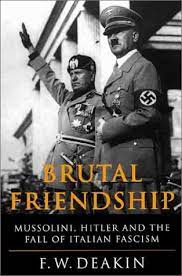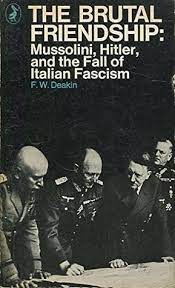Goodreads meta-data is 912 pages in two volumes, rated 3.82 by 17 litizens.
Genre: History.
Verdict: Compelling.

The rapport of these two despots has a fascination about it. While we – at this distance – are inclined to lump them together, the author goes into great detail about their many differences through a magnifying glass applied to conference notes, letters, telegrams, police files, spy reports, diaries, briefing papers, memoranda, and unpublished journalism. It draws the reader into the inner circle of Italian fascism.
In so doing, it undermines one of our preconception for there was in fact no inner circle orbiting Mussolini as there was Hitler. Hitler’s satellites had come to him in the 1920s and stayed: Goering, Goebbles, Hess, Boreman, and others. Mussolini had no such moons in orbit around him. He did not cultivate such a clan but made use of the talents around him and then made changes. A trusted colleague from the earliest days of the March on Rome would be sent off to Buenos Aires as ambassador, while another became Governor of Sicily, and so on. His clients circulated, and none, not even his son-in-law and partner in many crimes, Galezzo Ciano, was an intimate like Goering or Goebbles were to Hitler.
Nor did he have the same obedience from the army. While from 1937 onward all German army officers and men swore an oath of alliance to the man Adolf Hitler, in Italy the military oath was to the king. Victor Emmanuel was a very cautious and circumspect person, on this telling, who realised that his own position was artificial, but who nonetheless kept his distance from Il Duce, seeing him only on formal occasions with others present. As the war developed into endless crises these formal meetings disappeared. But the king maintained an extensive network of contacts in the army and navy, but not the air force, the ranks of which were much more likely to include committed fascists than in the other two services.
Il Duce had no enthusiasm for the Russian invasion, but cooperated to affirm the German alliance. From mid-1942 he spoke to Ciano about a separate peace with the Soviet Union so as to concentrate on the Anglo-Saxons. He also bruited this possibility once in person to Goering who laughed it off. Finally, at least once on Mussolini’s direct instructions Ciano raised it with Hitler who flew into a rage, making very clear his complete obsession with destroying the Communists.
Mussolini’s penchant for moving his clients around eroded personal loyalty to him. Even the most able and dedicated acolyte might be sent off to Madagascar as a military attaché. Mussolini did this not because he felt threatened by rivals – Deakin makes it abundantly clear that he had none – but he was indifferent to others; they really were chessmen to him, pieces with certain abilities to be used and then shelved. Not even when he was toppled and imprisoned did a rival stake a claim on Fascist leadership the way Himmler and Goering each tried to do when the Third Reich disintegrated.
Enjoyed the story of Pierre Laval travelling eighty hours by car to a meeting with Hitler, where he has only a few minutes to speak before Hitler went into one of diatribes about the vacillating French, drowning out the practical requests Laval wanted to make. In all Laval had about 20-minutes in which Hitler listened to him, eyes glazed, and then Laval got back into the car for the return of another eighty hours.
The title comes from a remark of Hitler’s in his own last days when he lamented the fact that his esteem for Mussolini led him into a ‘brutal friendship with Italy’ that cost him the war. As usual with Hitler, someone else was responsible, not him.
According to my marginalia, I read this book in September 1971 and have since retained the impression of its excellence. When it came to light recently on the shelves while I was searching for something else, I put it aside and started to re-read, and then found it hard to put down.

